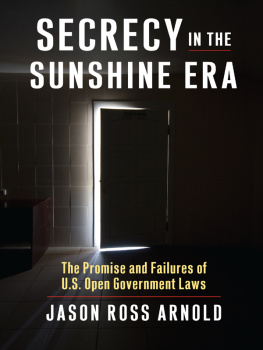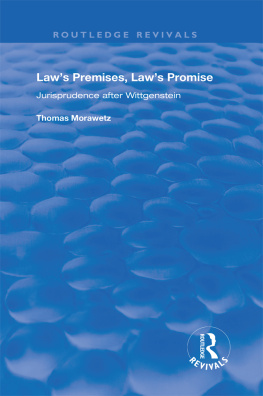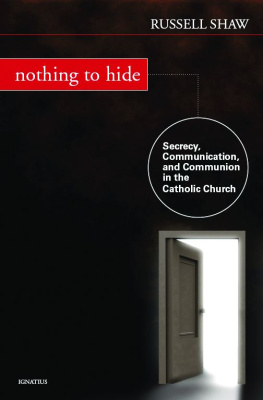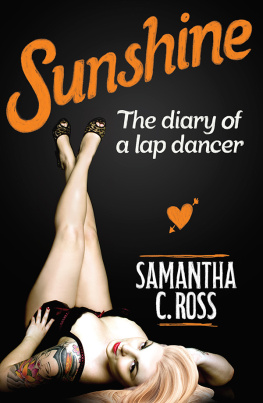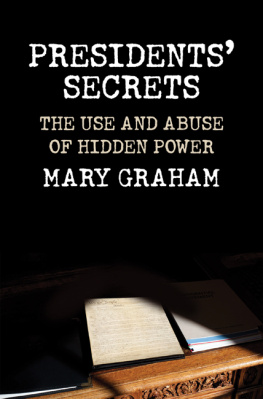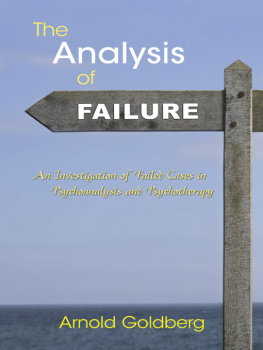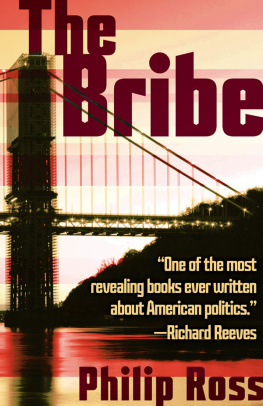2014 by the University Press of Kansas
All rights reserved
Published by the University Press of Kansas (Lawrence, Kansas 66045), which was organized by the Kansas Board of Regents and is operated and funded by Emporia State University, Fort Hays State University, Kansas State University, Pittsburg State University, the University of Kansas, and Wichita State University
Library of Congress Cataloging-in-Publication Data
Arnold, Jason Ross, author.
Secrecy in the sunshine era : the promise and failures of U.S. open government laws / Jason Ross Arnold.
pages cm
Includes index.
ISBN 978-0-7006-1992-4 (hardback)
ISBN 978-0-7006-2042-5 (ebook)
1. Freedom of informationUnited States. 2. United StatesPolitics and government1989 3. United StatesPolitics and government19451989. I. Title.
KF5753.A765 2014
342.730662--dc23
2014019779
British Library Cataloguing-in-Publication Data is available.
Printed in the United States of America
10 9 8 7 6 5 4 3 2 1
The paper used in this publication is recycled and contains 30 percent postconsumer waste. It is acid free and meets the minimum requirements of the American National Standard for Permanence of Paper for Printed Library Materials Z39.48-1992.
PREFACE AND ACKNOWLEDGMENTS
This is not the book I intended to write. I began the project in 2010 with every intention of comparing how democratic governments have complied with their transparency obligations. The idea was to track the globalization of freedom of information laws and then compare how they fared in practice. After gathering data from a range of casesincluding the United StatesI sat down in May 2011 to start writing. For reasons I cannot remember, I first dove into the US chapter.
By Memorial Day, the chapter had grown large and unwieldy, pushing 100 pages and filled with too many sections. The book obviously needed two US chapters, I thought, maybe divided between pre- and post-9/11 periods. As I continued, the two-chapter restraint seemed increasingly pointless. So did the narrow focus on the Freedom of Information Act (FOIA). So I kept going where I was going, points unknown. The global secrecy project needed to wait.
The books structure soon took form. I wanted to compare administrations and understand why some seemed more secretive than others, despite all of them having to operate under more or less the same information policy framework. As I collected stories about abuses of executive secrecy powers and officials clever and cynical (and clumsy) efforts to evade transparency laws, I realized that too many episodes came and went with the barest of traces. To my surprise, no one had put it all together before, at least not in the way I envisioned. The book I wanted to read during that first summer didnt yet exist.
I faced the same problem as anyone else studying secrecyat any rate, those of us without top security clearances. How would I construct a comparative political history of executive branch secrecy? The subject, after all, involved hidden information, exclusive knowledge. Clearly, we cannot document the secrecy system in full, observing and measuring every secret, knowing every transgression, every overclassification, every circumvention around open government laws. But because of those powerful laws, as well as leaks, lawsuits, journalism, and other secret-spilling mechanisms, hundreds of pieces of evidence have made their way into the public record.
As I gathered the pieces and stacked them up into piles for each presidential ). When they did exceed their predecessors in scale, they often did so by using tools and tricks those earlier officials had invented and developed. And then came Obama-Biden officials, promising the most transparent administration in history and ending their first term still trumpeting that promise despite the evidence.
The book therefore is a comparative historical analysis of administrations during the sunshine era, the period following the game-changing series of open government laws passed in the 1970s (the Federal Advisory Committee Act, the Government in the Sunshine Act, and the Privacy Act, as well as crucial FOIA amendments). I strove to make the analysis as comprehensive as possible, all the while recognizing the inherent problems of studying secrecy and the impossibility of including everything relevant. I was especially drawn to the intense drama of many of the secrecy conflicts. Hence, I didnt shy away from telling stories, despite what some of the hegemonic norms in political science say about that. Like Percival Godliman in Ken Folletts Eye of the Needle, I rediscovered how much I liked the unraveling of mysteries, the discovery of faint clues, the resolution of contradictions, the unmasking of lies and propaganda and myth. Like Iowa Bob in John Irvings Hotel New Hampshire, I got obsessed and stayed obsessed.
The book was hatched and developed at Virginia Commonwealth University (VCU), where I have many wonderful colleagues who offered continued support and encouragement even after the project changed shape. For that and other reasons, I thank the core political science faculty: John Aughenbaugh, Deirdre Condit, Herb Hirsch, Bill Newmann, Chris Saladino, Faedah Totah, and Judy Twigg. Extra thanks go to Deirdre for just being awesome. I also thank David Gompert, who read the entire manuscript, offered many valuable criticisms, and reminded me of the important differences between bunting, balking, and punting. VCU also afforded the able research assistance of Cindy Cors and Jessica Zielonis, as well as the dogged and resourceful librarian Bettina Peacemaker (thanks also to Bettinas colleagues Gail Warren, the state of Virginia law librarian, and Gail Zwirner, law librarian at the University of Richmond). I am also grateful for the students in my Political Institutions and Processes seminars who provided extensive comments and criticisms on earlier drafts. Thank you Cindy Cors, Kevin Harris, Grant Rissler, and Mona Siddiqui.
I often found strangers I contacted with random questions to be unexpectedly generous with their time. From their posts in government agencies, universities, advocacy organizations, and other nongovernmental organizations, the following people helped fill in missing pieces, share data, or confirm facts: Gavin Baker, Robert Chesney, Greg DeCarolis, Bette Farris, David Grimes, Stasia Hutchison, Christian Lee, J. William Leonard, Beth Lyon, Andrea Johnson-Stewart, Jacob Sullum, Peggy Ushman, Maggie Weber, Charles Weisselberg, and Nina Wilson. Thanks also to any others whose names Ive forgotten to include. Although I did sometimes encounter grumpy, uncooperative (and probably underresourced) FOIA officials, overall I was surprised and pleased with the level of responsiveness at government agencies.
Every author should be so lucky to have an editor like Chuck Myers. I realized my good fortune right away when he responded to my proposal with an incisive comment that helped me reframe the project. All along the way, he seemed to be an enthusiastic backer, and he was always a significant contributor and critic, identifying and helping to correct problems and thereby improving the book (blame any remaining errors on me). Thanks, Chuck, for all of this and for our many intellectually stimulating conversations. I am also grateful for the anonymous reviewers whose extensive comments and criticisms improved the book in many ways. Thanks also to Michael Kehoe, Larisa Martin, Becca Murray, Joan Sherman, and others behind the scenes at the University Press of Kansas for all of their hard work and patience as we transformed the manuscript into a finished product.


